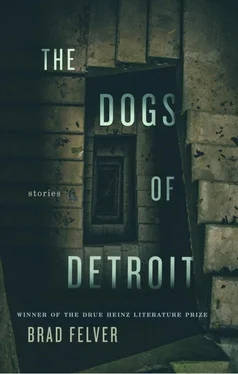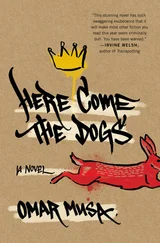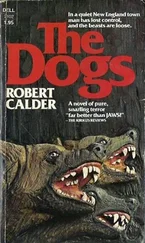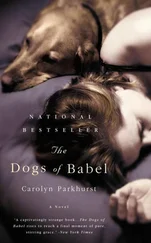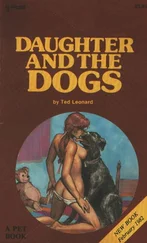Wiley watches her dance and fall and spin as if she is wrestling the rain. Her thin ripped dress clings to her stomach, revealing the hollow imprint of her belly button. He has forgotten the ape man, who stands behind him and stares without blinking. Wiley steps out in to the rain, where the fat drops are much colder than he expected, like small splotches of venom burning his bare skin, and he cannot fathom how Helen ignores it. When she sees him there, she rushes at him, tackles him to the mud and then cackles. And Wiley does not notice the cold then as she squeezes his stomach and growls, pretends to hammer his chest with her small fists. She pins him to the mud with her knees and batters his shoulders, grabs his head and smears it into the sloppy mud. They laugh and tumble in the mud. She rolls him to his stomach, stands, and then pounces again, driving her elbow into his back, and they laugh there in the mud yard while the ape man watches and pets the mule.
The night freezes the deluge, and the mud wrestling pit in the barnyard hardens into lumpy waves where Wiley and Helen have carved their imprints. If the uncle saw such a thing, he would grab his screwdriver and call for Wiley, but the uncle is still gone.
The mother wakes first to gather her children’s wet clothes and drape them near the fire. The dense mud is still stuck in between the cotton fibers, and they will never get any cleaner than they are now, but she does not worry over this, knowing that such a storm happens only rarely, knowing that her children do not laugh and play often enough.
Wiley wakes and trots to the barn in only his jockey shorts, leads the mule to the front porch and tethers him there to do his ring dance so they might eat breakfast. Helen emerges with the golden ring and slides it onto the rope. She sits on the porch steps, her tired eyes cast downward, her thin arms clutching her stomach. They sit quietly and drink from their mugs of water until their bellies bloat.
The fierce cold has returned, but Wiley and Helen sit on the porch and wait for their prey to arrive and make their donations so that they might scamper off and buy oats or wheat. The mule, which usually eats before the humans, noses through a day-old dung pile. Wiley is so hungry that he considers, for a moment, picking through it with the mule.
The ape man emerges from the barn, fully dressed with his pack and rifle. He wanders toward the front porch, and Wiley runs off to fetch him water again. The ape man does not stare at Helen. He watches the mule as it looms there, unmoving and stupid.
Would you like to give it a go? Helen asks.
The ape man squints down at her. Is the ring real gold? he asks.
Helen nods that yes, it is, though she does not know this for certain.
Wiley returns from the well, and the ape man drinks deeply. He is a menacing presence, and Wiley tries to stare through his clothes to see his scarred tattoos again, but he can see only those markings which reach up, clutching his neck like flickering flames.
No one has done it yet, Helen says.
The ape man reaches into his jacket pocket, pulls out four quarters, drops them into Helen’s palm. Helen looks over to Wiley and smiles. They can both taste the warm bread they will eat soon, once the ape man has given up and moved on.
The ape man does not test the rope or slide the ring toward the rigging. He sets his pack onto the frozen ground, slowly loads his Winchester. He levels it to the mule’s head and squeezes off a single round.
The mule collapses into a heap. Steam pulses from it. Its muscles jerk and twitch, unshod hooves knocking on porch boards. The mother bursts through the front door and stops when she sees the ape man with his rifle. Helen cowers behind, and for a moment the world idles, and they fear what is next.
The mule’s legs seize, and all goes quiet. Then the ape man sheaths the rifle back into his pack. He walks to the pile of dead mule, bends, examines the bridle and the ring on the rope, which is still attached.
I’ll be back through for my ring, he says, and he leaves.
In three days the uncle returns. He has still not traded all the rum, and so he is drunk from the last measure of it, the congealed traces at the cask bottom which he must chew on like fat. The dead mule lingers on the front porch, and he sees this first. Even the wilting brain has been left alone because they are afraid to move anything. It is Wiley who must tell him what happened, how he could not protect the uncle’s prize mule. It is all his fault, was all his idea. He knows the mule was sterile and there is no replacing it. He has considered running away from here because the uncle’s vengeance will be gruesome. Surely it will leave him with a limp or blurred vision or without thumbs. Perhaps all of those things. But it is his job to be the family shield, to absorb twice the punishment so that his sister, his lovely smart sister, will avoid disfigurations, will marry a sweet man who can buy her shoes and parasols and fresh milk. He is not a stupid boy, has known for years how things must be.
The uncle thinks Wiley lies about the ape man. Stupid boy! he shouts and squeezes his wrist, hauls him into the workshop. Tell me what happened!
Wiley repeats the story. He leaves nothing out. He tells the uncle about the ring game they used to survive while he was away for so long and about the salesmen who stopped. The uncle smacks and kicks him for this, and Helen runs toward her brother, paws at the uncle to make him stop. The uncle turns to her, but Wiley pushes her away and says that some of the salesmen stopped for longer, some even visited the mother. Inside, he says. At this, the uncle’s face hardens. He snatches Wiley up by the armpit, driving an elbow into his neck. He slams Wiley’s face onto the workbench, and the boy’s orbital bone cracks. He yelps. The uncle jams a knuckle into Wiley’s temple, slowly, increasing the pressure until it seems his brain will explode like the mule’s. Wiley cannot even manage a moan. A croak trickles from his the back of his throat, and gobs of saliva drain onto the workbench.
What happened? the uncle demands, but Wiley cannot answer. His boiling blood pumps through his cracked cheek and throbbing eye. Thick drops form in his tear duct as if he is crying blood. Then the sound of the uncle rattling in the toolbox, finding the flat-blade screwdriver, the knowledge of what is to come.
Then Helen is standing over him. His vision is blurry. He paws at his face, which is puffy and raw. His broken eye socket has not been reset. He feels the bandages cinching his thumbs, feels them pulse against the swelling.
Helen lifts his head, pours hot sorghum rum down his throat. He swallows and coughs. My eye, he says.
I know, she says. Don’t worry, she says.
The mother’s flesh grays nearly overnight. Her spine slumps, and she no longer wakes first with her peacocks. Some quiet plague has infected them, and the mother’s limbs swell and darken with a brutal malignancy. Helen bends over her, sleeping little. She worries not just of her mother’s condition but of her own fate if she dies.
The uncle carries on as before. He does not speak to Wiley, though he does tend to the mother when she coughs and moans during the night. They all seem to understand that she will die soon, though no one knows what to call her disease and no one speaks of it. It is not an uncommon thing in such a place to grow sick suddenly and die of a nameless contamination.
For Wiley, it is as if some hulking and unseen banshee has descended upon his world. The uncle’s torture is not new, nor is the threat of the mother’s death. He paws at his pinched socket often. The eyelid will not close fully now, and even his hearing has grown strained from it, the vibrations of sound plunging into a hollow conduit and then rattling at the base of his neck. More than all this, it is the thought of the of ape man returning that tortures him. Even the uncle, who claims he does not believe the story, does not touch the rotting mule.
Читать дальше
